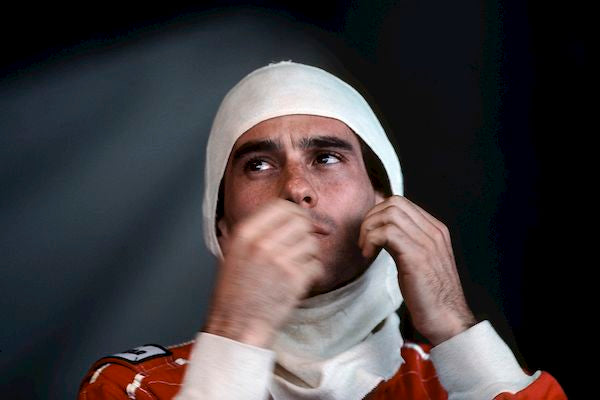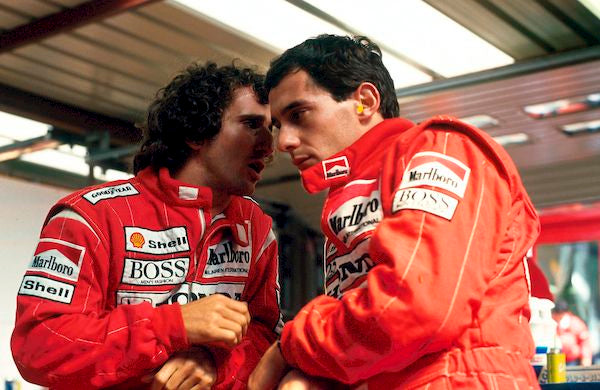Ayrton Senna


Frédéric Lecomte-Dieu
While America is living through terrible times, with the assassinations of Martin Luther King Jr. and Robert Kennedy, French students are confronting the police and a general strike is paralyzing Charles de Gaulle's government, a little boy climbs into his go-kart.
Ayrton Da Silva is tens of thousands of miles away from these events. In fact, he is unaware of them. He's only eight years old.
Sitting back in his leather seat, he closes his eyes. Just for a moment. The difficulties he's had in getting around since birth vanish as soon as he takes the wheel. That day, he broke 95 km/h. Tears of joy roll down his cheeks. He laughs, he screams.
For several months, he's known he'd be a Formula 1 driver one day. And so has his family, one of the wealthiest in south-east Brazil. His father, Milton Da Silva, would have preferred him to one day take over the family's flourishing businesses: the car trade and the metal factory. His mother, Donna Senna, was so afraid that he would seriously injure himself. But their son already has a great personality. " No "means no.
On Friday afternoons, just look at his face when he leaves school. He daydreams all the way to the family farm. He just takes the time to drink a glass of milk, munch a bar of dark chocolate before driving the little Jeep, specially fitted out for him. From one of the mounds of grass in the garden, his older sister, Viviane, and his younger brother, Léonardo, applaud his performance. They are his very first fans.
On February 11, 1973, thanks to his father's good connections, he went to the Formula 1 Grand Prix in Sao Paulo. He didn't miss a thing. To the delight of the Brazilian public, and despite the presence of Jackie Stewart, Jackie Ickx, Arturo Merzario, " the local boy "Emerson Fittipaldi wins the race. Ayrton is by his side as the winner answers the press. Embraces beautiful young groupies. Glory.
A year later, he won his first league title. The Sao Paulo Winter Cup trophy never leaves his possession. He takes it everywhere, " living my dream is now within reach ".
He maintains his body by running, not putting on weight. Eating mainly fish, fresh vegetables and fruit.
He's a shy teenager who likes to be in the race workshops. He makes friends with the mechanics, especially Tché, " I like this quiet boy because he always gives his all. He knows where he wants to go. He loves to run and win. He loves speed! ".
Brazilian artist Sid Mosca designs his helmet in the colors of their native country, " I thought about using more yellow than green, as this color is more vibrant. ". Ayrton smiles and congratulates him. A physical and mental trainer, Nuno Cobra, follows him.
Senna doesn't want to leave anything to chance. He already decides everything. With kindness but also with firmness.
At 18, he wins the Brazilian karting championship. He takes sixth place in the World Championship at Le Mans.
He leaves his parents' comfortable home for a long stay in Italy. He is expected at the home of kart legend Angelo Parrilla. It's a life-changing experience, as he doesn't speak Italian. He hangs on, " hardening the mind is crucial in life and in what I want to do with it ".
In Estoril, Portugal, he takes part in the World Karting Championship. In front of 20,000 spectators, he loses to Dutchman Peter Koene. It was a hard blow, " I'll never forget this failure ".
In 1980, in Nivelles, Belgium, he fell victim to the determination of Dutchman Peter De Bruijn. He considered returning to business studies, but after three months of soul-searching, he returned to racing.
He won a string of single-seater titles and earned a place in Formula 1. He is 20 years old. He takes his mother's name, Senna. Ayrton Senna.
He is taken to the Toleman stables. The technical director, Pat Symonds, is dazzled by his integration. he's not like those young wolves who come in all guns blazing. He's methodical, hard-working and mature! We'll go along with him! He's so easy to work with! ". A few months later, he took over from Johnny Cecotto, the leading driver.
The world of Formula 1 is discovering another facet of this young Brazilian. His spiritual life counts for a lot. He prays. Talks openly about God, without wanting to convert others.
On March 25 1984, he was in Rio de Janeiro. For the Grand Prix. The pressure is on. The press seizes on the event.
Alain Prost, driving for Maclaren-Tag, is the clear favorite. Senna knows that this race will be difficult. His single-seater was running on uncompetitive tires. In the end, he breaks down, and from the stands he witnesses the Frenchman's tenth victory.
June 3rd 1984. Monaco is hit by heavy rain. 13e on the starting grid, he nevertheless made his way through. On the 19the lap, he overtook Niki Lauda to take second place. In front of his hood, Alain Prost. World championship leader. The duel between the two drivers thrilled the public, the press and the sponsors.
But at 32e lap, for safety reasons, Jacky Ickx stops the race. Furious, despite the red flag waving, Senna refused to comply and crossed the start line. As for Alain Prost, he stopped his single-seater in front of it.
In these conditions, the Frenchman signs his twelfth victory, the Brazilian a second place, " I really had to win, but until you cross the line first, it's impossible to be sure. Formula 1 is a lot of money, a lot of politics... When you're a kid, you have to deal with that! "The words are harsh. The audience knows that from now on this angel's face is a wild beast and that he won't let go of anything.
This first confrontation in a long series is writing the most intense pages in Formula 1 history. The men vie for the world title.
In 1989, at the Suzuka Grand Prix in Japan, they were neck and neck for the world title. Senna closes the corner, and both cars leave the track. Prost gives up. He continues. He wins the race, but is disqualified in favor of the Frenchman.
The rivalry is at its peak, " I in no way caused the accident. They put it all on me and I'm penalized for it! They treat me like a criminal. Of course, I thought about quitting. I thought about going home and not coming to Australia. However, as I've already said, racing and competition are in my blood! It's all part of me and part of my existence. It comes before everything else, as you well know... "
The trade press is delighted to have this show.
A year later, they meet again in the Empire of the Rising Sun. The stakes are the same. But there's a change: the Frenchman is with Ferrari. At the first start, Senna crashed into him. By causing this accident, the Brazilian became world champion. Prost is furious. Now it's his turn.
In 1991, at the Brazilian Grand Prix, from his winning single-seater, he screamed his delight. He is now one of Formula 1's most celebrated drivers.
On November 7, 1993, he won the Australian Grand Prix. Prost was second, but even before taking part in the event, he was already world champion, for the fourth time in his career. He officially announces the event as his last Grand Prix. Before climbing onto the podium, Senna asks him to come up beside him. The Frenchman was touched by the gesture. It was a powerful image, and one that made the front pages of the media.
To his surprise, Senna phoned him regularly. He's lost his best adversary. He misses him. He hopes he'll be back on the track. Prost smiles. They're friends now. From his retirement in Switzerland, he better understands the personality of his former team-mate and challenger.
The 1994 season begins. After leaving McLaren, Senna drives for Williams-Renault. He had known British driver Frank Williams for twelve years. Both men know that the " target "is the new darling of Formula 1. Michael Schumacher at Benetton. He leads the world championship by 20 points. Senna, three-time world champion, must win the next duel. He hasn't signed anything for three years. He retired from the two previous Grand Prix. But he knows that the FW16 doesn't have what it takes to have a chance of victory. It remains difficult to handle. Private testing was inconclusive. something's wrong with the aerodynamics ".
On Thursday morning, April 28, 1994, he landed in northern Italy aboard his private jet. In three days' time, the San Marino Grand Prix will be held on the Imola circuit. He's 34, a billionaire. His girlfriend is beautiful. He has everything to be happy.
He is expected to attend a press conference to present the " Senna bicycle ". He wears a suit, a tie, " this is business ".
Friday lunchtime marked the first day of testing. From his single-seater, he sends a message to his former adversary, now commentator, " a special hello to my dear friend Alain, we miss you!" From his television booth, Prost smiles.
He set the fastest time.
At 1:20 pm, at 200 km/h, Rubens Barrichello lost control of his single-seater. He is carried off unconscious. The young compatriot's godfather, Senna, announces the good news to journalists, " he's shocked, but everything's fine ".
On Saturday April 30, the heat is stifling. It's the second day of testing. Roland Ratzenberger, 34, suffered a technical failure on his Simtek S941, and crashed into the safety wall at over 300 km/h. The impact was impressive.
Senna is shocked. He had witnessed the accident live, alongside Bernard Dudot. He asked to see the driver in hospital, but was refused access. The chief doctor tells him it's all over. He left the scene in tears.
Many people think that tomorrow's Grand Prix will be cancelled, but that's not the case. The stakes are too high. He will be present for the 161st race of his career.
Sunday 1er May 1994. The Formula 1 world came back to him. The crowd is huge. He starts from pole position. He has tamed his FW16. The start is scheduled for 2:30 p.m.
In his pit, Senna is alone. He's concentrating. As usual, he meditates. He sees and re-examines every corner. Then he prays, " I believe in Jesus, son of God... "Hands folded. No one dares disturb him.
He leaves his bible in the paddock, grabs a small flag in Austria's colors, " I'm going to show it to the world at the end of the race ". Roland Ratzenberger was Austrian.
Outside the pits, sitting in his single-seater, he doesn't put on his helmet. This is a first. His face is offered up to television and photographers. He looks magnificent, serene.
The start is given.
A collision opens the race. Between Pedro Lamy's single-seater and JJ Lehto's Benetton. The other competitors had to follow a safety car at reduced speed. For six laps. Time to clear the track of debris from the crashed single-seaters.
Finally, the track is clear. He keeps the lead. Schumacher and Gerhard Berger follow. 14h18. At the Tamburello exit, his Williams hits the wall violently. There is consternation. He doesn't leave his single-seater. Eight long seconds pass. In Sao Paulo, his family witnessed the end of the dream. Alain Prost grits his teeth, his features frozen.
His pulse is pounding. The right front suspension perforated his helmet and eardrum. Doctors try to resuscitate him. Breaking the unbearable silence, a helicopter lands on the runway. He was taken to Bologna.
The race continues. A final drama: a single-seater seriously mows down three mechanics. In the end, Michael Schumacher wins the Grand Prix. No champagne is poured.
By 5:30 pm, he was brain dead. In every church in Brazil, people are praying. Weeping.
At 6.30pm, Maria-Teresa Fiandri, Head of Intensive Care at Maggiore Hospital, officially announced his death.
Hundreds of hysterical journalists scream. Demand details. Two policemen lead the poor, emotional woman towards the exit. A fan of the pilot, she murmurs, " she was a rare person ". Silence falls again.
Two billion people attend the funeral. Alain Prost is there. He recalls their last conversation that Sunday, their exceptional handshake, " good luck Ayrton ", " thanks friend ".
In the end, night covered his tombstone. The story is over, but Ayrton Senna's legacy lives on, thanks to a foundation that bears his name and his millions of fans around the world.
"I am one of those who have known the night. I walked in the rain and in the rain I came back. I left behind the last glimmer of the city. I plunged my gaze into its saddest alley. I passed the watchman on his rounds and lowered my eyes, refusing to explain. I halted and stopped the sound of my footsteps. Then, in the distance, an interrupted cry came to me from another street, over the rooftops. But not to say come back! Farewell either. And still further away, at an infinite height, a clock shone against the sky, proclaiming: "the moment is neither right nor wrong". I am one of those who have known the night. Robert Frost
Frédéric Lecomte-Dieu@ copyright.
